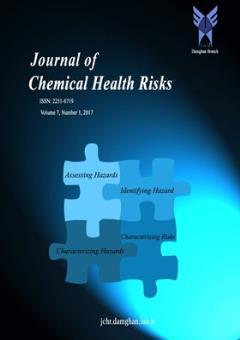Luteolin Co-treatment abates Polystyrene Microplastics (PS-MPs) Induced Spermatotoxicity and Dysgonadogenesis in Rats Via up-regulation of Gonadotropin, Enhanced Spermatogenesis, Downregulation of Caspases, and Oxido-inflammation
محورهای موضوعی :
Oyovwi Mega Obukohwo
1
![]() ,
Ohwin Peggy Ejiro
2
,
Ohwin Peggy Ejiro
2
1 - Department of Physiology, Adeleke University, Ede, Osun State, Nigeria
2 - Department of Physiology, Faculty of Basic Medical Sciences, Delta State University, Abraka, Nigeria
کلید واژه: Luteolin, Polystyrene microplastics, Oxido-inflammation, Apoptosis, Spermtotoxicity, Dysgonadogenesis,
چکیده مقاله :
Polystyrene microplastics (PS-MPs) pose a significant scientific concern due to their chemical makeup. Luteolin (LUT), a phytochemical-biological substance with anti-oxidative and anti-inflammatory properties, was tested against polystyrene microplastics (PS-MPs)-induced reproductive toxicity in male Wistar rats. The rats were randomly assigned to 4 groups and treated as follows: Group I received 0.01 mL kg-1 of DMSO alone, Group II received 100 mg kg-1 of LUT dissolved in DMSO, Group III received 0.01 mg kg-1 of PS-MPs, and Group IV received 0.01 mg kg-1 of PS-MPs and 100 mg kg-1 of LUT. PS-MPs alone dramatically increased sperm morphological defects, xanthine oxidase, and lipid peroxidation while decreasing testicular enzymes, luteinizing hormone (LH), follicle-stimulating hormone (FSH), testosterone, antioxidants, and interleukin-10 (IL-10). The study demonstrates that PS-MPs can alter male rat testicular function and androgenicity. However, as a result of LUT co-treatment, sperm count, motility, and viability were increased whereas MDA and XO, IL-1β and TNF-α, and caspase-3 activities in the testis were reduced. Supplementing with LUT might act as a cytoprotective agent to lessen the spermatotoxicity and dysgonadogenesis brought on by PS-MPs.
Polystyrene microplastics (PS-MPs) pose a significant scientific concern due to their chemical makeup. Luteolin (LUT), a phytochemical-biological substance with anti-oxidative and anti-inflammatory properties, was tested against polystyrene microplastics (PS-MPs)-induced reproductive toxicity in male Wistar rats. The rats were randomly assigned to 4 groups and treated as follows: Group I received 0.01 mL kg-1 of DMSO alone, Group II received 100 mg kg-1 of LUT dissolved in DMSO, Group III received 0.01 mg kg-1 of PS-MPs, and Group IV received 0.01 mg kg-1 of PS-MPs and 100 mg kg-1 of LUT. PS-MPs alone dramatically increased sperm morphological defects, xanthine oxidase, and lipid peroxidation while decreasing testicular enzymes, luteinizing hormone (LH), follicle-stimulating hormone (FSH), testosterone, antioxidants, and interleukin-10 (IL-10). The study demonstrates that PS-MPs can alter male rat testicular function and androgenicity. However, as a result of LUT co-treatment, sperm count, motility, and viability were increased whereas MDA and XO, IL-1β and TNF-α, and caspase-3 activities in the testis were reduced. Supplementing with LUT might act as a cytoprotective agent to lessen the spermatotoxicity and dysgonadogenesis brought on by PS-MPs.


